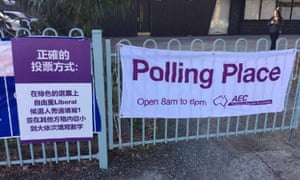Parties go to great lengths in search of an electoral advantage. The
federal court’s Christmas eve judgment shows it could potentially be a
crime
It was the best of times – for treasurer Josh Frydenberg
and Liberal MP Gladys Liu. It was the worst of times – for former
acting Victorian Liberal director, and now Frydenberg staffer, Simon
Frost.
There will be no byelections in Kooyong and Chisholm – because the federal court has ruled there was “no real chance” that Chinese-language signs, designed to look as though they were the Australian Electoral Commission’s, changed the election result.
But Frost is facing the prospect of a declaration he committed an illegal practice by authorising misleading corflutes which used the AEC purple and white colour scheme to tell voters the “correct” or “right” way to vote was to put 1 next to the Liberal candidate.
A breach of section 329 of the Electoral Act could result in referral
to the director of public prosecutions for prosecution of an offence
punishable by up to six months in prison, or a fine of $1,200 or both.There will be no byelections in Kooyong and Chisholm – because the federal court has ruled there was “no real chance” that Chinese-language signs, designed to look as though they were the Australian Electoral Commission’s, changed the election result.
But Frost is facing the prospect of a declaration he committed an illegal practice by authorising misleading corflutes which used the AEC purple and white colour scheme to tell voters the “correct” or “right” way to vote was to put 1 next to the Liberal candidate.
The court found that Frost authorised the corflutes which “were likely to mislead or deceive an elector in relation to the casting of a vote”.
Frost gets one last chance to avoid this outcome.
The justices noted that Frost gave evidence at the hearing but was not “personally represented”. So before the court issues a direction to inform the registrar of the high court “of any finding of an illegal practice … by him at least in respect of the characterisation of the corflutes” – it gave Frost an opportunity to put submissions “as to why such a direction should not be made”.
The extraordinary Christmas Eve judgment with a new due date for submissions (7 February, 2020) is sure to leave Frost in a less-than-festive mood over the holiday season.

At the 2016 election Labor used text messages from Medicare to warn voters that “time was running out” to save public health insurance – which resulted in new legislation banning impersonation of a commonwealth entity.
At the 2019 election, the Victorian Liberal Party deployed the signs, which Frost conceded under cross-examination were designed to convey the impression that they were AEC corflutes.
The signs were authorised (in fine print) by Frost on behalf of the Liberals – enough to avoid a case under the new “Mediscare” laws, but not enough to put them beyond the reach of the “misleading and deceptive” provisions of the Electoral Act.
There are other sharp practices in politics that have to be cleaned up – including fake how-to-vote cards like those in Dickson which encouraged minor party and independent voters to put Peter Dutton ahead of Labor.
But the lesson from Tuesday’s judgment is that pushing the envelope in search of electoral advantage can be a crime.
One final thought on this chapter of the Chinese language sign saga: why on earth did the AEC not just stand on the sidelines instead of actively intervening on behalf of the political party which the court has found tried to mislead voters?
On election day, the AEC relied on a narrow interpretation of the law: that it only bans misleading voters on the process of voting, not the formation of their political judgment. The AEC thought the corflutes did not meet this higher bar – the court disagreed.
But so overzealous was the AEC in protecting this initial judgment, it asked the court to throw out the case before the hearing on the basis the challengers had not found any voters who said they changed their votes as a result of the signs.
Kooyong independent Oliver Yates and fellow challenger Vanessa Garbett get some vindication from Tuesday’s judgment, while the AEC’s record was to fight against a legal case that could expand its role in fighting misinformation and – in this case – protect its own reputation for independence.
The case did not achieve the improbable victory that could imperil the Morrison government’s majority through two byelections. But it was not a clean bill of health for Australian politics, the conduct of the Liberal Party and the AEC.
Let’s hope the new year brings to politics a renewed focus on the formation of voters’ judgment – the marketplace of ideas – and not the arms race of dirty tricks.

No comments:
Post a Comment